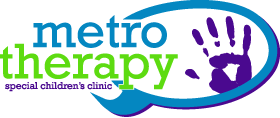
Pediatric Speech and Language Therapy in Fridley, MN
As children grow, they learn more than just words and phrases. They learn how to hold conversations, think about what they read and hear, and understand the impact of their words. But some children have difficulty with the ins and outs of speech and language, which is where pediatric therapy comes into play. Metro Therapy offers pediatric speech and language therapy at our clinic in Fridley, MN. If your child has trouble with pronunciation, reading, sharing their thoughts, or understanding others, our dedicated speech-language pathologists can help. Let’s work together to help your child be the very best they can be.
What Is Pediatric Speech and Language Therapy?
Pediatric speech therapy is a specialized treatment that helps children learn to pronounce sounds. It involves learning how to move the lips, tongue, teeth, and jaw correctly to produce clear speech sounds and establishing correct speech sound patterns. Language therapy is a different area of treatment that helps children understand and use vocabulary, concepts, and increasingly complex syntax to communicate with others. Language therapy can also help with the social and cognitive aspects of communication such as understanding figurative language or nonverbal cues. A child can have trouble with speech, language, or both areas of communication.
Our speech-language pathologists (SLPs) use evidence-based techniques to build children’s speech and language skills. We can also help children learn to use Alternative and Augmentative Communication (AAC) as needed.
Signs Your Child Might Need Speech Therapy
Children may need support with speech even if they don’t have any other disability or disorder. The common signs that could indicate a need for speech therapy include:
Difficulty pronouncing specific sounds
Omitting, replacing, or adding sounds to words
Speaking with a hoarse, nasally, or breathy voice
Experiencing chronic sore throats
Having a cleft lip or cleft palate
Stuttering (repeating or prolonging sounds)
Cluttering (speaking in a disorganized way, often rapidly)
Coughing, gagging, or choking when eating
Being upset, angry, or anxious about speaking
Struggling in school
Signs Your Child Might Need Language Therapy
Your child may be able to speak clearly and still need support with language, even if they have no other disability or medical conditions. The common signs that a child needs language therapy include:
Not using 8-10 words by 18 months
Not using 50+ words by 2 years
Not understanding instructions or directions
Having a limited vocabulary compared to their peers
Using improper grammar despite correction
Being unable to put their thoughts into words easily
Appearing confused by social interactions
Having trouble telling stories in sequence
Difficulty starting or maintaining a conversation
Giving answers that seem unrelated to the questions asked
Not using 2-3 word phrases by 2 years
Struggling with literacy (reading comprehension, writing, vocabulary)
The Goal of Pediatric Speech and Language Therapy
Our goal at Metro Therapy is to develop your child’s speech and language skills so they can freely communicate their ideas and understand others. We improve your child’s ability to engage in their natural environments in a meaningful and purposeful manner with a comprehensive therapeutic approach combined with family involvement and education. We believe that, with your encouragement and our expertise, we can empower your child’s communication skills so they can be the very best they can be.
How the Pediatric Speech and Language Therapy Evaluation Process Works
When you arrive for your child’s appointment, our SLP will assess their communication to determine their abilities and limitations. This comprehensive evaluation will include a discussion with you to find out more about your child’s strengths and weaknesses with their receptive or expressive language or speech. Next, our SLP will work with your child to observe and evaluate their speech and language directly using standardized tests or other assessment tools. These steps give us the information that we use to develop your child’s customized therapy plan to address their specific needs.
How Speech and Language Therapy Can Help Your Child
Your child’s therapy plan will involve specific activities and exercises designed to build their speech and language skills. We may also give you games or activities to do with your child at home so they can continue to practice their skills. And if you ever have any questions, our SLPs will be happy to provide answers. With routine sessions and your encouragement, we can help your child:
Learn how to communicate their ideas more easily
Improve their speech sound production for increased intelligibility
Improve the tone, quality, and volume of their voice
Build essential literacy skills that will help them in life
Understand syntax, grammar, and other language skills
Learn to effectively use alternative means of communication
Improve their social skills
Understand what others are asking of them
Achieve their communication goals for improved confidence
Conditions We Treat
Our SLPs have successfully helped children who have many different conditions, including:
Autism spectrum disorders
Learning disorders
Craniofacial disorders
Apraxia of speech (speech sound disorder)
Seizure disorders
Hearing loss
Down syndrome
Developmental delays
Schedule Your Pediatric Speech and
Language Therapy Evaluation
Our pediatric speech-language pathologists are ready to help your child master their communication skills and build their self-confidence. If you are worried about your child’s speech or language milestones, call us. We’ll work with you to help your child be the very best they can be.
Schedule a pediatric speech and language therapy evaluation today.


